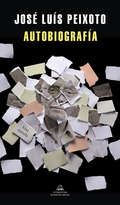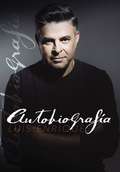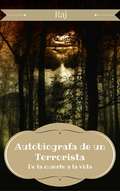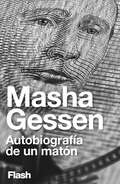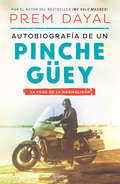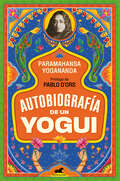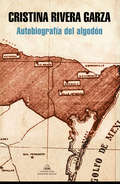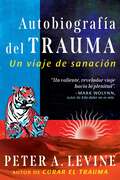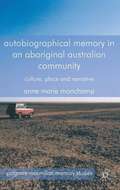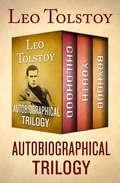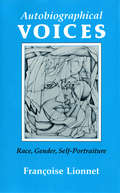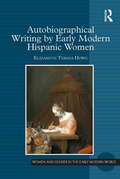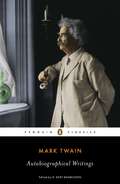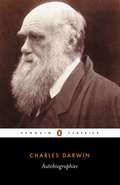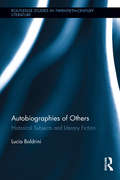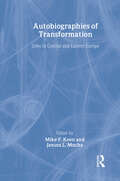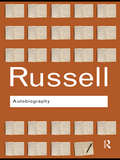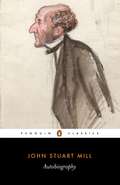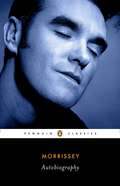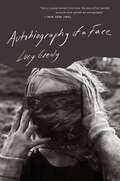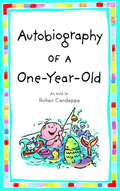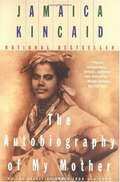- Table View
- List View
Autobiografía
by José Luís PeixotoAutobiografía funde realidad y ficción en un juego de espejos que enfrenta a dos genios: José Saramago y José Luís Peixoto. «Relatarme a mí mismo a través del otro y relatar al otro a través de mí mismo, esto es la literatura.» En la Lisboa de finales de los años noventa, el camino de un joven escritor en plena crisis creativa -tal vez el propio Peixoto cuando comenzaba- se cruza con el de un gran escritor: José Saramago. De esa relación nace esta historia, en la que se diluyen las fronteras entre lo ficcional y lo puramente biográfico. La valentía de proponer al premio Nobel como protagonista de una novela titulada Autobiografía ya nos avisa de que estamos ante una sorprendente propuesta narrativa que solo puede llevar al lector a un final inesperado. José Luís Peixoto, al que José Saramago calificó como «una de las revelaciones más sorprendentes de la literatura portuguesa», explora en estesingular juego de espejos la creación literaria y los traslúcidos límites entre la vida y la literatura. Y al mismo tiempo, ahonda en sus obsesiones, como es habitual en él, con una prosa cargada de detalle y de lirismo, en esta impactante obra que sin duda marcará el futuro de las letras portuguesas. Reseñas:«Ningún lector que se aproxime a Autobiografía lo hará desprevenido. Sabrá -pues para eso existen los medios de comunicación- que un joven escritor llamado José, tal vez el propio Peixoto cuando comenzaba, se encuentra con un autor maduro y consagrado, José Saramago, este sí con nombre y apellido. Entre ambos, con lo que no existe fuera del libro y lo que existió en la vida real y literaria de por medio, surge una historia de encuentros y desencuentros en una atmósfera que a veces recuerda a la que, en otro tiempo y en otra circunstancia, José Saramago creó para relatar la vida de Ricardo Reis Y Fernando Pessoa durante el año en que ambos murieron. La historia de Peixoto, al contrario que la de José Saramago, no trata sobre la muerte, sino que relata una vida que comienza con orgullo y deseos. El escritor consagrado es la referencia, el futuro deseado, que provoca a la vez admiración y un incontrolable repudio: en todas las circunstancias de la vida los maestros son la medida de las cosas, el estímulo que necesita ser combatido para que el aprendiz no se vea cercenado. Este libro es la agónica lucha de un escritor joven con amores y pérdidas, aventuras diversas aquí y allí, personajes que vienen de otros mundos, voces diáfanas y voces misteriosas, todas ellas al compás del ritmo propio y ya consagrado de José Luís Peixoto.»Pilar del Río «Un reto brutal del que José Luis Peixoto sale más que airoso, componiendo un texto lúcido y en ocasiones brillante, emocionante para los seguidores de Saramago y que respaldan a su autor como uno de los nombres de referencia de la actual literatura portuguesa.[...] Un libro lleno de momentos portentosos, instantes repletos de imaginación...» Ramón Rozas, Diario de Pontevedra «Una personal y original lectura del legado saramaguiano que se funde con el universo y las obsesiones que [...] José Luís Peixoto persigue.»Luís Ricardo Duarte, Visão «El principal riesgo de Autobiografía era agotarse en el plano del mero homenaje, pero Peixoto evita esa trampa al construir una narración que se expande en varias direcciones acumulando capas de complejidad.»José Mário Silva, Expresso «Peixoto tiene una extraordinaria forma de interpretar el mundo, expresado por preciosas imágenes y un excelente uso del lenguaje.»The Times Literary Supplement «Una de las revelaciones más sorprendentes de la literatura portuguesa actual.»José Saramago
Autobiografía
by Luis Enrique«Todo en la vida tiene su momento. Benditas sean las experiencias y el aprendizaje que nos hacen recordar y revisar el camino por donde hemos andado.Con la canción titulada “Autobiografía” decidí contarte un poco de mi historia de inmigrante que, a través de mi libro, conocerás con más detalle.Compartir mi vida en estas páginas me ha llenado de satisfacción y ha movido cada fibra en lo más profundo de mi ser… espero que al terminar de leerlo sientas que me conoces más, y si has pasado o estás pasando situaciones similares a las que yo viví, sepas que no estás solo».—Luis EnriqueEl reconocido autor e intérprete de grandes éxitos y premiado con los más importantes galardones de la industria musical se estremece al narrar su historia, su infancia llena de música y política, su desgarrador enfrentamiento con el maltrato y el viaje de supervivencia que emprendió siendo adolescente al abandonar su natal Somoto, en Nicaragua, para establecerse como indocumentado en Estados Unidos.El príncipe de la salsa nos abre las puertas a lo más íntimo con historias nunca antes contadas en un tono sincero y apasionante que llenarán tu corazón de esperanza.
Autobiografía de un Terrorista - De la Muerte a la Vida
by Carlos Corzo Fernández RajHay muchas personas que han manifestado su incredulidad con respecto al hecho de que todo este libro sea en sí, la narración de un terrorista, y tienen dudas sobre la veracidad de la historia. Me gustaría responderles a todos ellos con ese adagio tan conocido de que: "A veces, la realidad supera a la ficción " Lo que tenemos que entender aquí es que, la mayoría de los terroristas en el mundo son jóvenes engañados; sus mentes han sido manipuladas, y toda esa ficción con la que se les ha alimentado, para ellos, es la verdad que más importa en sus vidas. Y a pesar de que la mayoría de ellos se haya endurecido hasta un punto sin retorno; hay algunos que se han dado cuenta de su locura, y han podido regresar a la vida humana normal, después de abandonar el camino de la muerte y de la destrucción. Esta es la historia de uno de esos jóvenes.
Autobiografía de un matón (Flash Ensayo #Volumen)
by Masha GessenUn retrato de la vida de Vladímir Putin antes de ascender al poder. Autobiografía de un matón relata la primera etapa vital de Vladímir Putin antes de convertirse en presidente de Rusia. Putin nació en 1952 en Leningrado, una ciudad totalmente empobrecida, y pasó su vida escolar bajo un gobierno comunista. Durante la adolescencia se vio envuelto constantemente en peleas y se enorgullecía de ser un matón. Putin decidió prepararse para llegar a ser espía del KGB, y llegó a trabajar como agente secreto en Alemania. Gessen utiliza los años de formación de Putin para mostrar al lector hasta qué punto moldearon al hombre en el que se convirtió. El texto es un extracto del libro El hombre sin rostro: El sorprendente ascenso de Vladímir Putin, en el que la autora explica: «A lo largo de los años noventa, mientras jóvenes como yo intentábamos salir adelante en un país nuevo, junto al nuestro existía un mundo paralelo. Yo había estado en muchas zonas de guerra, había trabajado bajo fuego de metralla, pero esta era la historia más aterradora que había tenido que escribir; nunca antes me había visto obligada a describir una realidad tan desprovista de emociones y tan cruel, tan patente y tan despiadada, tan corrupta y con una falta tan completa de remordimientos. En unos años, Rusia estaría viviendo en esa realidad. Cómo sucedió es la historia que contaré en este libro.»
Autobiografía de un matón (Flash Ensayo #Volumen)
by Masha GessenUn retrato de la vida de Vladímir Putin antes de ascender al poder. Autobiografía de un matón relata la primera etapa vital de Vladímir Putin antes de convertirse en presidente de Rusia. Putin nació en 1952 en Leningrado, una ciudad totalmente empobrecida, y pasó su vida escolar bajo un gobierno comunista. Durante la adolescencia se vio envuelto constantemente en peleas y se enorgullecía de ser un matón. Putin decidió prepararse para llegar a ser espía del KGB, y llegó a trabajar como agente secreto en Alemania. Gessen utiliza los años de formación de Putin para mostrar al lector hasta qué punto moldearon al hombre en el que se convirtió. El texto es un extracto del libro El hombre sin rostro: El sorprendente ascenso de Vladímir Putin, en el que la autora explica: «A lo largo de los años noventa, mientras jóvenes como yo intentábamos salir adelante en un país nuevo, junto al nuestro existía un mundo paralelo. Yo había estado en muchas zonas de guerra, había trabajado bajo fuego de metralla, pero esta era la historia más aterradora que había tenido que escribir; nunca antes me había visto obligada a describir una realidad tan desprovista de emociones y tan cruel, tan patente y tan despiadada, tan corrupta y con una falta tan completa de remordimientos. En unos años, Rusia estaría viviendo en esa realidad. Cómo sucedió es la historia que contaré en este libro.»
Autobiografía de un pinche güey: La fuga de la normalidad
by Prem DayalPrem Dayal, este simpático italiano, ha conquistado los corazones de los mexicanos con su libro de éxito Me vale madres. Ahora, en este libro autobiográfico, Dayal se desnuda y nos cuenta su vida. Autobiografía de un pinche güey comienza como un legado para la nieta de Dayal. A través de este legado, él le mostrará el mundo en el que creció: la educación de la mamma y la nonna, por supuesto, su adolescencia, su primer amor, su vida en el mundo bajo como es la droga y su venta, algunas pillerías que hizo y su entrada al teatro como alumno del gran Darío Fo. Así, conoceremos su trayectoria que pudo haber sido la de cualquiera, y a lo largo de su lectura que nos hará tanto reír como llorar, encontraremos paz y el deseo de una persona que dejó de ser feliz con lo que dijeron que él era para convertirse en lo que verdaderamente deseaba. Prem Dayal, este simpático italiano, ha conquistado los corazones de los mexicanos con su libro de éxito Me vale madres. Ahora, en este libro autobiográfico, Dayal se desnuda y nos cuenta su vida: sus problemas, su incursión en las drogas y como dealer, sus enamoramientos, su entrada al teatro, sus divertidas historias y defiende, nuevamente, cómo la educación es lo que destroza la vida de las personas.
Autobiografía de un yogui
by Paramahansa YoganandaRecuperamos el gran clásico de la espiritualidad del siglo XX en una nueva traducción y con un prólogo inédito de Pablo d'Ors. Considerada una de las obras más relevantes del siglo XX, Autobiografía de un yogui es el relato en primera persona de una vida extraordinaria. Paramahansa Yogananda nos cuenta en ella cómo parte de su pueblo natal a la búsqueda de su gurú. El suyo será solamente el primer encuentro con sabios y místicos, que, a través de estas páginas, nos acercan su saber. Publicada hace más de setenta años, esta obra llevó por primera vez el pensamiento oriental, la meditación y el yoga a Occidente. Su legado son las preciosas enseñanzas del maestro Yogananda, que han inspirado a miles de lectores y que aún hoy perduran y señalan el camino de la iluminación. Pablo d’Ors ha escrito:«No creo que este libro pueda leerse sin que se produzca una transformación espiritual en su lector.»
Autobiografía del algodón
by Cristina Rivera Garza"Autobiografía del algodónAutobiografía algodón dota de un nuevo y extraordinario significante al territorio de la frontera norte de México, que aquí se erige majestuoso sobre el movimiento nómada y las rutas de recuerdos." Yásnaya Elena Aguilar Indagar sobre el origen personal es abrir la puerta a muchas preguntas, a silencios y respuestas impensadas que a veces terminan por ser un revés de la memoria. En Autobiografía del algodón, Cristina Rivera Garza sigue con curiosidad y asombro los pasos de aquellos hombres y mujeres que habitan su pasado familiar, obreros y campesinos que trabajaron la tierra que ahora conforma la frontera entre Tamaulipas y Texas, una región que alcanzó un alto nivel económico, social y cultural gracias al sistema de siembra del algodón. Es así que esta novela es, además de íntima, un reencuentro con el territorio. O un desencuentro, debido a la migración, deportación, expulsión y repatriación de aquellos campesinos algodoneros que, tras el fracaso del sistema, dejaron libre su espacio, antes símbolo de progreso, hoy ocupado por la llamada guerra contra el narco.
Autobiografía del trauma: Un viaje de sanación
by Peter A. Levine• Comparte el viaje personal del autor para sanar su grave trauma infantil, así como sus avances para crear el método Somatic Experiencing• Explora cómo llegó a ver a Einstein como su guía espiritual y mentor personal, solo para descubrir una conexión de la vida real con él a través de su madre• Explica cómo el método Somatic Experiencing deriva de los estudios de animales en sus entornos naturales, la neurobiología y 50 años de observaciones clínicasEn estas memorias íntimas, el renombrado desarrollador de Somatic Experiencing, Peter A. Levine, el hombre que revolucionó la forma en que los psicólogos, médicos y curanderos entienden y tratan las heridas del trauma y el abuso, comparte su viaje personal para sanar su propio trauma infantil severo y ofrece una visión profunda de la evolución de su innovador método de curación.Al presentarse como un Quirón moderno, el sanador herido de la mitología griega, Levine describe, con detalle gráfico, la violencia de su infancia, yuxtapuesta a recuerdos felices específicos, y cómo ser guiado a través de la Experiencia Somática (SE) le permitió iluminar y desenredar sus pensamientos y heridas traumáticas. También comparte los sueños y visiones misteriosos e inesperados que lo han nguiado a lo largo de su vida, incluidas las visitas oníricas de Albert Einstein, a quien considera su guía espiritual y mentor personal.Al explicar cómo ayudó a miles de personas antes de resolver su propio trauma, el autor detalla cómo el método SE se fundamenta en sus estudios de animales salvajes en su hábitat natural, neurobiología y más de 50 años de observaciones clínicas. Levine nos enseña que cualquier persona que sufre un trauma tiene una historia valiosa que contar y que, al compartir nuestras historias, podemos catalizar el retorno de la esperanza, la dignidad y la plenitud.
Autobiographical Memory in an Aboriginal Australian Community
by Anne Marie MonchampThis book shares and analyses the stories of Opal, a senior Alyawarra woman. Through her stories the reader glimpses the harsh colonial realities which many Aboriginal Australians have faced, highlighting the cultural embeddedness of autobiographical memory from a philosophical, psychological and anthropological perspective.
Autobiographical Trilogy: Childhood, Youth, and Boyhood (Autobiographical Trilogy #1)
by Leo TolstoyThese three connected early novels from the author of War and Peace and Anna Karenina form an intimate portrait of Russian youth. Begun when Leo Tolstoy was just twenty-three years old and stationed at a remote army outpost in the Caucasus Mountains, his work known as the Autobiographical Trilogy would win immediate fame and critical praise years before works like War and Peace and Anna Karenina would bring him to the forefront of Russian literature. Here is the story of a young man—the son of a wealthy Russian landowner—who describes in exquisite detail both the landmarks and minutiae of his life, from his interactions with other people to observations on the nature of both himself and the world around him. As told by Nikolenka from the ages of ten to sixteen, it is a brilliantly insightful recollection of the formative years of life—with all of the ebullient joy and crushing heartbreak it entails—that still resonates in our modern world. Originally planned as a four-part series of novels tentatively called the &“Four Epochs of Growth,&” the completed works together form a remarkable expression of the great Russian novelist&’s early voice and vision, which would ultimately make him one of the most renowned and revered authors in literary history. This ebook has been professionally proofread to ensure accuracy and readability on all devices.
Autobiographical Voices: Race, Gender, Self-Portraiture (Reading Women Writing)
by Françoise LionnetAdopting a boldly innovative approach to women’s autobiographical writing, Françoise Lionnet here examines the rhetoric of self-portraiture in works by authors who are bilingual or multilingual or of mixed races or cultures. Autobiographical Voices offers incisive readings of texts by Zora Neale Hurston, Maya Angelou, Marie Cardinal, Maryse Condé, Marie-Thérèse Humbert, Augustine, and Nietzsche.
Autobiographical Writing by Early Modern Hispanic Women
by Elizabeth Teresa HoweWomen’s life writing in general has too often been ignored, dismissed, or relegated to a separate category in those few studies of the genre that include it. The present work addresses these issues and offers a countervailing argument that focuses on the contributions of women writers to the study of autobiography in Spanish during the early modern period. There are, indeed, examples of autobiographical writing by women in Spain and its New World empire, evident as early as the fourteenth-century Memorias penned by Doña Leonor López de Cordóba and continuing through the seventeenth-century Cartas of Sor Juana Inés de la Cruz. What sets these accounts apart, the author shows, are the variety of forms adopted by each woman to tell her life and the circumstances in which she adapts her narrative to satisfy the presence of male critics-whether ecclesiastic or political, actual or imagined-who would dismiss or even alter her life story. Analyzing how each of these women viewed her life and, conversely, how their contemporaries-both male and female-received and sometimes edited her account, Howe reveals the tension in the texts between telling a ’life’ and telling a ’lie’.
Autobiographical Writings
by Mark TwainAn intimate look at Mark Twain that only he himself could offer A must-have for all lovers of Mark Twain, this selection of his autobiographical writings opens a rare window onto the writer’s life, particularly his early years. Born on November 30, 1835, in Florida, Missouri, Samuel Langhorne Clemens first used the pseudonym Mark Twain while a journalist in Nevada in 1863. When his first major book, The Innocents Abroad, appeared six years later, he began what would become one of the most celebrated and influential careers in American letters. Autobiographical Writings will help readers know the author intimately and appreciate why, a century after his death, he remains so vital and appealing. .
Autobiographies
by Charles DarwinThe Autobiographies of Charles Darwin (1809-82) provide a fascinating glimpse into the mind of one of the world's intellectual giants. They begin with engaging memories of his childhood and youth and of his burgeoning scientific curiosity and love of the natural world, which led to him joining the expedition on the Beagle. Darwin follows this with survey of his career and ends with a reckoning of his life's work. Interspersed with these recollections are fascinating portraits - from his devoted wife Emma and his talented father, both bullying and kind, to the leading figures of the Victorian scientific world he counted among his friends, including Lyell and Huxley. Honest and illuminating, these memoirs reveal a man who was isolated by his controversial beliefs and whose towering achievements were attained by a life-long passion for the discoveries of science.
Autobiographies of Others: Historical Subjects and Literary Fiction (Routledge Studies in Twentieth-Century Literature)
by Lucia BoldriniIn this volume, Boldrini examines "heterobiography"—the first-person fictional account of a historic life. Boldrini shows that this mode is widely employed to reflect critically on the historical and philosophical understanding of the human; on individual identity; and on the power relationships that define the subject. In such texts, the grammatical first person becomes the site of an encounter, a stage where the relationships between historical, fictional and authorial subjectivities are played out and explored in the ‘double I’ of author and narrating historical character, of fictional narrator and historical person. Boldrini considers the ethical implications of assuming another’s first-person voice, and the fraught issue of authorial responsibility. Constructions of the body are examined in relation to the material evidence of the subject’s existence. Texts studied include Malouf’s An Imaginary Life, Carey’s True History of the Kelly Gang, Ondaatje’s The Collected Works of Billy the Kid, Adair’s The Death of the Author, Banti’s Artemisia, Vázquez Montalbán’s Autobiografía del general Franco. Also discussed, among others: Yourcenar’s Memoirs of Hadrian, Tabucchi’s The Last Three Days of Fernando Pessoa, Giménez-Bartlett’s Una habitación ajena (A Room of Someone Else’s).
Autobiographies of Transformation: Lives in Central and Eastern Europe (Studies in European Sociology)
by Mike F. Keen Janusz L. MuchaAutobiographies of Transformation is a completely unique history of sociology in Central and Eastern Europe in the post-Communist era. Through the autobiographies of ten key sociological witnesses from the region, the sociological imagination is turned upon itself, resulting in a compelling and revealing account of the struggles, triumphs, and continuing challenges faced. The sociologists examined fall into three cohorts: early, mid and late career. As participants, each of the sociologists included has witnessed the intersection of history and biography in Central and Eastern Europe. As sociologists, they have tried, and continue to try, to connect the two so that they and their fellow citizens may better understand their circumstances and the futures that may follow. This revealing book, ideal for students and researchers of sociology, and Central and Eastern Europe studies, provides powerful and compelling autobiographical accounts, relating them to the current interest in this area's transformation.
Autobiography
by Bertrand RussellBertrand Russell remains one of the greatest philosophers and most complex and controversial figures of the twentieth century. Here, in this frank, humorous and decidedly charming autobiography, Russell offers readers the story of his life - introducing the people, events and influences that shaped the man he was to become. Originally published in three volumes in the late 1960s, Autobiography by Bertrand Russell is a revealing recollection of a truly extraordinary life written with the vivid freshness and clarity that has made Bertrand Russell's writings so distinctively his own.
Autobiography
by Bertrand RussellBertrand Russell remains one of the greatest philosophers and most complex and controversial figures of the twentieth century. Here, in this frank, humorous and decidedly charming autobiography, Russell offers readers the story of his life – introducing the people, events and influences that shaped the man he was to become. Originally published in three volumes in the late 1960s, Autobiography by Bertrand Russell is a revealing recollection of a truly extraordinary life written with the vivid freshness and clarity that has made Bertrand Russell’s writings so distinctively his own.
Autobiography
by John Stuart Mill John RobsonOne of the greatest prodigies of his era, John Stuart Mill (1806-73) was studying arithmetic and Greek by the age of three, as part of an astonishingly intense education at his father's hand. Intellectually brilliant, fearless and profound, he became a leading Victorian liberal thinker, whose works - including On Liberty, Utilitarianism, The Subjection of Women and this Autobiography - are among the crowning achievements of the age. Here he describes the pressures placed on him by his childhood, the mental breakdown he suffered as a young man, his struggle to understand a world of feelings and emotions far removed from his father's strict didacticism, and the later development of his own radical beliefs. A moving account of an extraordinary life, this great autobiography reveals a man of deep integrity, constantly searching for truth.
Autobiography
by MorrisseySteven Patrick Morrissey was born in Manchester on May 22nd 1959. Singer-songwriter and co-founder of the Smiths (1982-1987), Morrissey has been a solo artist for twenty-six years, during which time he has had three number 1 albums in England in three different decades. Achieving eleven Top 10 albums (plus nine with the Smiths), his songs have been recorded by David Bowie, Nancy Sinatra, Marianne Faithfull, Chrissie Hynde, Thelma Houston, My Chemical Romance and Christy Moore, amongst others. An animal protectionist, in 2006 Morrissey was voted the second greatest living British icon by viewers of the BBC, losing out to Sir David Attenborough. In 2007 Morrissey was voted the greatest northern male, past or present, in a nationwide newspaper poll. In 2012, Morrissey was awarded the Keys to the City of Tel-Aviv. It has been said 'Most pop stars have to be dead before they reach the iconic status that Morrissey has reached in his lifetime. 'Autobiography covers Morrissey's life from his birth until the present day. 'Five stars. With typical pretension, Morrissey's first book has been published as a Penguin Classic. It justifies such presentation with a beautifully measured prose style that combines a lilting, poetic turn of phrase and acute quality of observation, revelling in a kind of morbid glee at life's injustice with arch, understated humour . . . It is recognisably the voice of the most distinctive British pop lyricist of his era' Neil McCormick, Daily Telegraph'A brilliant and timely book . . . What is so refreshing about Morrissey's Autobiography is its very messiness, its deliriously florid, overblown prose style, its unwillingness to kowtow to a culture of literary formula and commercial pigeon-holing . . . Autobiography is a true baggy monster, a book in which a distinctive prose style is allowed to develop . . . A rococo triumph . . . Overwhelmingly this is a book to be thankful for . . . In the ways that matter, Autobiography reads like a work of genuine literary class' Alex Niven, Independent'Sharply written, rich, clever, rancorous, puffed-up, tender, catty, windy, poetic, and frequently very, very funny. Welcome back, Morrissey'Michael Bonner, Uncut Magazine'Rancorous, rhapsodic, schizophrenic: Autobiography delivers a man in full'Andrew Male, Mojo'If one is willing to accept that a Morrissey book could be a classic, then the book justifies its status remarkably early on. . . . As a work of prose Autobiography is a triumph of the written word' Louder than war'Funnier than the Iliad . . . A triumph'Colin Paterson, Today Programme, BBC Radio 4'One of the autobiographies of this or any year . . . A wonderfully entertaining read. He's as witty, acerbic and opinionated as you'd expect, but there's a welcome self-awareness throughout that makes the dramatic flourishes and hyperbolic dismay all the more hilarious. He may have more flaws than Manchester's Arndale Centre but he's just brilliantly, uniquely Morrissey'Daily Mirror'Morrissey's Autobiography is brilliant and relentless. Genius, really' Douglas Coupland'Well, so far Morrissey's book is an absolute masterpiece; no doubt the whole stinking country will hate it'Frankie Boyle'This is the best book ever. Like ever'Wonderland 'Carried along on quite extraordinary prose'Time Out'The Best Music Biog Ever . . . In the world of rock autobiographies, Morrissey's is nigh-on perfect'NME'Practically every paragraph has a line or two that demands to be read aloud to the mirror, tattooed on foreheads, carved on tombstones' Rolling Stone'Morrissey is a pop star of unusual writing talent'New York Times
Autobiography Of A Face
by Lucy GrealyA New York Times Notable Book. This "harrowing, lyrical autobiographical memoir . . . is a striking meditation on the distorting effects of our culture's preoccupation with physical beauty" (Publishers Weekly).It took Lucy Grealy twenty years of living with a distorted self-image and more than thirty reconstructive procedures before she could come to terms with her appearance after childhood cancer and surgery that left her jaw disfigured. As a young girl, she absorbed the searing pain of peer rejection and the paralyzing fear of never being loved.“This is a young woman’s first book, the story of her own life, and both book and life are unforgettable.”??—??New York Times “Engaging and engrossing, a story of grace as well as cruelty, and a demonstration of [Grealy's] own wit and style and class."??—??Washington Post Book World
Autobiography Of A One-year-old
by Rohan Candappa“I am a one-year-old and this is my autobiography. . . . ” Have you ever looked at your baby and wondered what he or she is thinking? Are you ready to find out? “I thought it was about time someone told it like it is. So I’m spilling the beans on the world of a one-year-old. A world where you’re left in the charge of totally inept parents. Where everything’s at completely the wrong height. Where you’re not allowed to splash in the bath but you are in the pool. Where nobody understands a single word you say. And where diapers and poop loom large at every turn. “It’s a roller-coaster ride through one heck of a year. I’ve laughed a lot, I’ve cried a lot, I’ve learned a lot. And so will you. You might even discover the answer to that age-old question: Humpty Dumpty — did he fall or was he pushed? “Anyway, must run. I see a bowl of tepid gloop is being spooned out for me. What joy. ” Welcome to the wonderful world of your one-year-old. From the Trade Paperback edition.
Autobiography Of My Mother
by Jamaica KincaidKincaid's new and long-awaited novel is a powerful and unforgettable story of loss, longing, loving, and survival that resonants with the proud insurgence of the human will. The story of Xuela, whose mother dies at the moment she is born, presents "an indeliable portrait of an angry woman" (New York Times) "most comparable, perhaps, to Camus' The Stranger" (Washington Post Book World).
